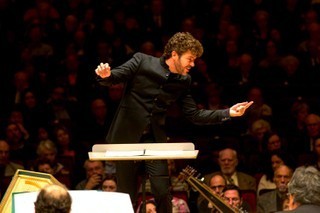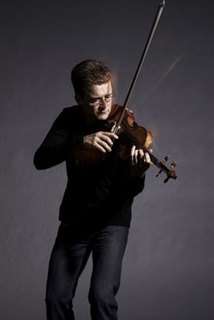|
Back
Tetzlaff Versus Mendelssohn New York
Isaac Stern Auditorium, Carnegie Hall
10/29/2015 -
Igor Stravinsky: Suite No. 2
Felix Mendelssohn: Violin Concerto No. 2, opus 64
Peter Ilych Tchaikovsky: Symphony No. 1 “Winter Daydreams”, opus 13
Christian Tetzlaff (Violin)
Orchestra of St. Luke’s, Pablo Heras-Casado (Conductor)

P. Heras-Casado (© Richard Termine)
At Carnegie Hall last night, we had a choice of saints. In Zankel Hall, the St. Lawrence Quartet was introducing a string quartet by John Adams. And I was so tempted to hear them. But plunked instead for the less challenging second saint, Saint Luke’s Orchestra, with those old standbys Mendelssohn, Tchaikovsky and Stravinsky.
St. Luke’s which did begin as a chamber orchestra of 21 virtuoso musicians in New York’s Church of St. Luke-in-the-fields some forty years ago, is not a full-sized, virtuoso orchestra. Not the size of the New York Phil (only some 60 players), but hardly chamber-sized. And their virtuosity continues to this day. In fact, with their very first work, the Stravinsky Second Suite, one could see the benefit of having a smaller orchestra. For this was totally transparent orchestration.
The seven-minute March, Waltz, Polka and Galop is written for pairs of winds, trumpets, trombone, tuba and percussion, and the result is like a miniature Pulcinella. It was circus music, but Stravinsky’s circus was like Picasso’s circus: lean, colorful, filled with solos, just a wee bit off-beat and totally delightful.
I mention Picasso, since their conductor, Pablo Heras-Casado, while an international star, does have that Iberian rhythm, the vivid painting in his conducting and real excitement.

C. Tetzlaff (© Alexandra Vosding)
After the Stravinsky, we came to the astonishing Mr. Tetzlaff. I am tempted to capitalize the word astonishing, because wonder and astonishment are virtually tied to the name Tetzlaff. Nor did he fail to astound the audience with the Mendelssohn Violin Concerto. How the hell he makes his fingers offer quantum speed, his bow produce such radiating tones, his mixture of passion and propulsion is not for mere humans to analyze.
Which did not, I’m afraid, make for great Mendelssohn. He gave little heed to Mr. Heras-Casado in the first movement, playing as quickly (and usually accurately) as possible, getting ahead of the orchestra, letting them catch up for a second and then running ahead of them. The second movement was time for an attempt at serenity. But that was an intermezzo for the finale. Whatever ragged edges might have peeped out were more than recompensed by the élan, the urbanity, the ease of the performer.
Mr. Tetzlaff’s performance called for the inevitable demonstrations by the audience, but they were applauding an Olympic athlete. Whatever artists claim, they are certainly influenced by their audience, and here he saw an elderly conservative group who were all too ready to be wowed.
Which is what he did. Mendelssohn was somewhere in the mix, but they were applauding the performer.
After the intermission, we had a boisterous Tchaikovsky First Symphony, with its lovely Russian tunes, its attempt at German-style development, and a finale as exciting as the 1812 Overture. Great trumpet and horn playing, a beautiful oboe solo. And Mr. Heras-Casado gave it all the volition it deserved.
Having a smaller orchestra, like Saint Luke makes those delicious melodies even more poignant. Having a volatile conductor like Mr. Heras-Casado offered a finale which brought down the house. I have heard it played with more maestoso, and even some bumptious humor in the beginning of the finale. But by the time the conductor came to that glorious coda, everything else was forgotten. The “winter daydreams” had melted, and we had a sunny martial finish which any of Tchaikovsky’s Tsarist cadet friends would have ravished.
Harry Rolnick
|